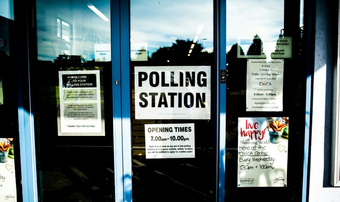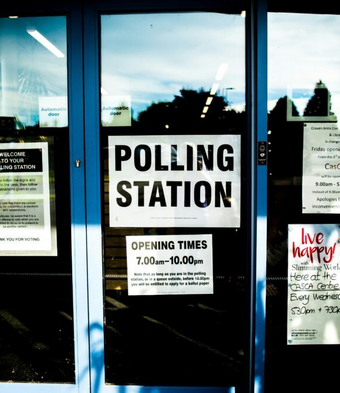Fixing Politics – the Labour Government’s biggest task
The country has voted for change. After fourteen years of Conservative government, the UK decisively broke with the outcome of the past four elections and opted for change. Labour, having made change the central tenant of their campaign, are now sitting pretty on 411 Parliamentary seats, with a working majority of 180 - one of the largest majorities in British political history!
Having promised to “stop the chaos, turn the page, and start to rebuild our country” the job now falls to Labour to deliver on their manifesto commitments. Aware that a change in government “is not in itself enough to tackle the deep-rooted challenges our country now faces”, Labour has outlined five missions central to rebuilding Britain: ‘kickstart economic growth’, ‘make Britain a clean energy superpower’, ‘take back our streets’, ‘break down barriers to opportunity’, and ‘build an NHS fit for the future’.
There is much here that one can agree with. For example, as has been widely reported, British economic growth has been stagnant and stuttering for far too long, underpinned by low productivity, high debt, poor wages, and chronic short-termism which has undermined investment, the delivery of public infrastructure, and economic innovation. Similarly, the NHS faces enormous challenges as seen in waiting lists that have been steadily rising since before the pandemic (let alone the rapid increases since), as well as A&E waiting times, and a rising mental health crisis.
However, regardless of what one makes of Labour’s diagnosis of the problems facing our country (let alone their proposed solutions), the circumstances they inhabit are undeniably challenging. Having been in office for less than a week, both Prime Minister Keir Starmer and Chancellor Rachel Reeves have spoken up the difficulties of the legacy they have been handed by the outgoing government.
Whilst on a trip to Washington D.C. Starmer told listening journalists “Some of what we’ve found is shocking, not so much about the finances but I have to say, on prisons, the situation is worse than I thought it was.” Similarly, Reeves in her first speech made her thoughts clear: “I have repeatedly warned that whoever won the general election would inherit the worst set of circumstances since the Second World War. What I have seen in the past 72 hours has only confirmed that.”
Now much of this is simply politics, it serves Labour well to speak up the damage done by the previous government (a tactic excellently employed by the Conservatives when they gained office in 2010) as it provides excuses for any challenges and makes any progress look more impressive. Yet, the broken Britain narrative has long since settled into the country’s bloodstream. Almost nobody needs to be convinced that nothing works.
I could quote all the statistics I like, but almost everyone I know could give you an example of state failure from their everyday life: be that waiting months and months for a routine NHS appointment, the astronomical price of housing across much of the country, or the shuttering of their local high street and with it, a declining sense of civic pride and vibrancy. It is these personal experiences that have sounded the death knell for the Conservative party.
Despite all the claims to have a working plan, after 14 years, simply no one believed them. For every time their lives rubbed up against the state, their experience pointed not to a functioning country, but one in a spiral of decline.
At one level it is almost fitting, that the overflowing of sewage became a near daily headline in the final months of Conservative rule. After all, nothing says decline quite like excrement pouring into rivers across the nation. The Conservative Party lost the trust of voters for so many reasons, but ultimately they simply failed to govern and convince voters that they could be trusted to govern.
This perhaps more than any other challenge set before him, is the biggest task sitting in Keir Starmer’s in-tray. Can he prove to voters that he is fit to govern, competent, understands the problems facing Britain, and is able to keep his promises? In other words, can he fulfil the basic tasks of government?
As the Labour manifesto indicated, Labour are eager to be seen to bring change into being with several high-profile announcements during their first week in power concerning housebuilding, economic growth, onshore wind farms, teacher recruitment, defence, and the NHS.
However, noise is not action, and it remains to be seen whether Labour’s early activity can be translated into the tangible change they promised. Starmer is clearly aware of the public’s irritation with undelivered commitments noting that “actions not words” are what are needed to rebuild public trust in his very first speech as Prime Minister.
Yet for all the best will in the world, the sheer scale and depths of the problems facing Britain are vast. Labour come to power at a time of severe geopolitical instability with war continuing to rage on in Ukraine, significant tension with China, and the ongoing conflict between Israel and Hamas causing utter devastation across Palestine. The international challenges facing Britain are some of the gravest we have faced in decades and arrive at a time when the size of our armed forces is at relatively historic lows.
The British economy, as noted earlier, is sluggish, underperforming and addicted to unsustainable levels of debt and consumerism which mask low productivity, and weak and insecure supply lines for key goods. Since the pandemic, the UK has been rocked by significant numbers leaving the workforce, many of whom are signed off on long-term sick leave seeing the welfare bill rise.
The prisons crisis mentioned above, is just one example of many where public services are stretched to potential breaking point. With the performance of water companies, the NHS, social care, schools, local councils, and the courts just several other examples widely talked about.
Immigration was considered amongst the most important issues at the election with 41% (the third highest) ranking it as such in a YouGov tracker. Whilst net migration figures are forecast to come down, the numbers of small boat crossings continues to rise.
There are huge asylum backlogs and, again whilst the numbers are coming down, the number of claims processed within 6 months is a pitiful 5.9%. Of course, this is a highly controversial area in which the ‘ideal’ is much disputed, but Labour cannot deny that immigration and small boat crossings are not a key priority for much of the electorate. Failure to do so, will only add further fuel to the populist fire in British politics – a fire that is burning far brighter and with a far more dangerous edge across Europe in the form of the rising AfD and National Front in Germany and France respectively.
This would be a significant task list in the best of times. Sadly, though, we do not live in the best of times, with state capacity significantly underperforming and/or under-resourced depending on who you speak to. Likewise, public finances are stretched as highlighted by Rachel Reeves. Perhaps the most significant difficulty the Labour Party faces however lies with trust.
The National Centre for Social Research recently published a report titled ‘Damaged Politics’? in which they look at the impact of the 2019-24 Parliament on political trust and confidence. The findings are worrying.
“45% would ‘almost never’ trust British governments of any party to place the needs of the nation above the interests of their own political party, more than ever before. 79% believe the present system of governing Britain could be improved ‘quite a lot’ or ‘a great deal’... 58% would ‘almost never’ trust politicians of any party in Britain to tell the truth when they are in a tight corner”. In fact, less than half of respondents thought democracy was working well.
After the scandals of the Boris Johnson government, the economic collapse of Liz Truss’, and the widespread perceived incompetence and decline of the Conservative Government under the past three Prime Ministers this is perhaps unsurprising. An election campaign which saw betting scandals concerning senior Tory insiders only furthered a reputation that had already soured.
Yet, in spite of the dire state of things, YouGov reported that Labour voters main reason for backing the party was… “to get the Tories out” on a whopping 48%, with “the country needs change” coming a distant second with 13%. A mere 5% said they were voting Labour because they agreed with their policies.
Furthermore, despite winning the lions-share of the Parliamentary seats, Labour got less of the national vote than they did under Jeremy Corbyn in 2017 (33.7% compared to 40%). From just under 34% of the vote, Labour gained 65% of the Parliamentary seats. In fact, despite winning the election overwhelmingly, the 2024 General Election actually saw many seats become far more marginal including across many Labour constituencies.
For all that Labour won this election, the Tories lost it. From a high of 43.6% of the vote in 2019, the Tories vote collapsed to a mere 23.7%. What’s more, the combined national vote share for the two main parties was the lowest it has been for more than a hundred years.
Despite all appearances, there is little enthusiasm for a Labour government, little enthusiasm for their manifesto, and ultimately little enthusiasm for their vision for change. Sure, the electorate voted overwhelmingly for change. But this took the negative form of “we don’t want the Conservatives”, rather than the positive “we want Labour”.
Stepping into Downing Street is one of the most powerful Labour governments ever elected, voted in by one of the most cynical and disillusioned electorates ever. Labour’s task list is long and complex, but what makes their job harder is having to take on some of the most intractable and touchy issues in British politics without a huge mandate for their vision of change.
You could of course argue that this makes it easier, the electorate is already fed up and they can hardly do a worse job so any improvement will see faith in government and politics begin to creep up. But this overlooks the impressive election performance of smaller parties such as Reform (14% vote share), the Greens (7% vote share, and pro-Gaza independents. More than ever, voters are looking elsewhere for answers, and the mainstays of British government are feeling the heat. Another five years of ‘failures’ and might we see increased votes for smaller parties, or perhaps rising support for more radical voices?
Starmer seems to have recognised the task before him, moving quickly in his first speech as Prime Minister, to build unity and repair bridges, accept the need to earn back the electorate’s trust, and note that whilst Labour promised change, “Changing a country is not like flicking a switch… This will take a while. But have no doubt that the work of change begins - immediately.”
Labour’s primary task as Starmer sees it is to restore faith that “Politics can be a force for good” and the task of government is the task of public service. Whilst you might not agree with their interpretation of exactly what this looks like, there are some deeply Christian themes contained within these words. For the biblical conception of government views public authorities as God’s servants instituted for our good (Romans 13).
Government is a common grace blessing to all, and public theologians repeatedly point to their purpose as the task of serving public justice. David Koyzis argues “God has ordained an institution with a unique task: to do justice to the diversity of individuals and communities in this world.” Similarly, Timothy Laurence suggests that “public authority exists for the good of the people…” which commends good and punishes evil, recognises its own limitations and focuses on public (not private) order, and governs according to law.
I am sure that in the coming years there will be much about the Labour Government’s plans I won’t agree with, not least the potential introduction of assisted suicide, but for now I commend the initial commitment to public service, competence in the basic tasks of government, and seeking to restore trust in politics as a force for good. And I look forward to being part of the team at CARE, who will be watching closely, and working fervently, to ensure Labour’s vision for change does indeed pursue public justice and not some distorted imitation.






